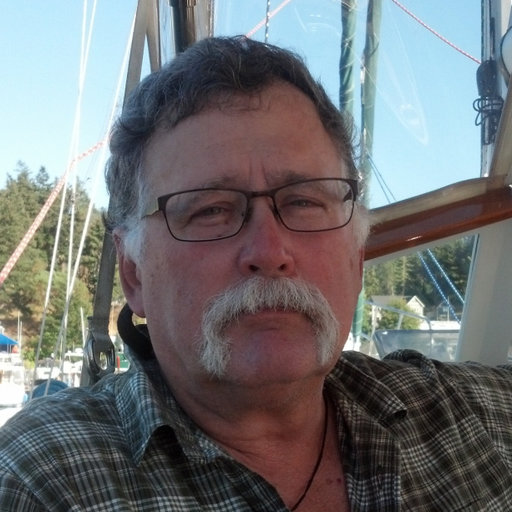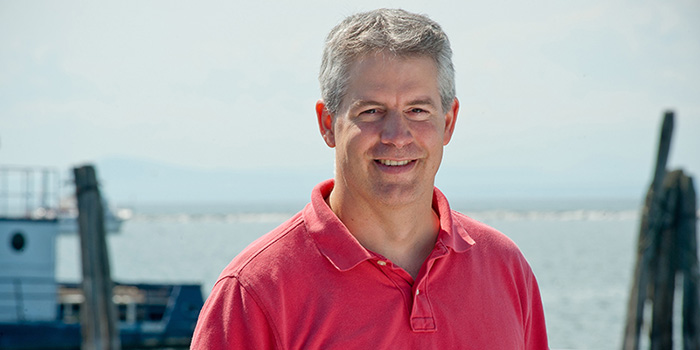
Lake Champlain Sea Grant Director Dr. Breck Bowden will be one of many upcoming presenters for the new Lake Champlain Sea Grant, Zoom a Scientist Program, developed in response to the COVID-19 epidemic. The Lake Champlain Sea Grant Program develops and shares science-based knowledge to benefit the environment and economies of the Lake Champlain Basin.
Dr. Bowden will discuss work from a VT EPSCoR RII Track-II collaborative award with researchers from Vermont, Delaware and Rhode Island – the Northeast Water Network or NEWRnet. This webinar takes place on Friday, May 1st at 12:00 PM and is free with online registration. It will include examples from Dr. Bowden's research focusing on land-use impacts on nitrate and dissolved organic carbon loading.
To learn more about NEWRnet – please visit www.newrnet.org.
To register for Dr. Bowden's presentation, click on the link below.
Register Online

Dr. Jason Stockwell, Director of the Rubenstein Ecosystem Science Lab, will present "Squeezing the Middle of Lake Champlain's Food Web" on Friday, May 8th at 12:00 PM. This webinar will explore the interaction of lake trout natural reproduction and stocking strategies and how it interacts with the potential for a quagga mussel invasion in Lake Champlain.
To register for Dr. Stockwell's presentation, click on the link below.
Register Online
These webinars are part of the "Zoom a Scientist" series introduced by the Lake Champlain Sea Grant Team as a way to extend learning to those isolated due to the COVID-19 pandemic. A new virtual learning experience streams every Tuesday and Friday from 12:00 to 1:00 PM. Each webinar is archived for future reference. Registration is free but required for participation.
To learn more about the Lake Champlain Sea Grant please visit www.uvm.edu/seagrant.
The schedule and registration links for individual webinars are as follows:
April 14: What Do Fish Do in the Wintertime? (http://go.uvm.edu/winterfish); Ben Block, a UVM graduate student, will provide insight into how fish in northern lakes adapt to conditions during colder months.
April 17: Climate Change in the Lake Champlain Basin: What's Already Happened and Where We're Headed (http://go.uvm.edu/basinclimate); Dr. Eric Leibensperger, SUNY Plattsburgh, will highlight climate changes already observed and changes projected to occur in the Champlain Valley.
April 21: A Fish's Story: Following Lake Trout Movement Around Lake Champlain (http://go.uvm.edu/fishstory); UVM Rubenstein School graduate student Matt Futia will explore recent advances in technology that allow researchers to track individual fish to understand their movement and behaviors.
April 24: Microplastics in Freshwater Systems (http://go.uvm.edu/microplastics); Dr. Danielle Garneau, SUNY Plattsburgh, will share findings from her research on microplastics in Lake Champlain.
April 28: Long-term Effects of Climate Change on Lakes and the Importance of Winter Sampling (http://go.uvm.edu/wintersampling); Dr. Jennifer Brentrup, postdoctoral associate at UVM and Dartmouth College, will describe research on the effects of climate change and extreme events on lakes and how dissolved oxygen levels are used to estimate lake metabolism under ice.
May 1: Sensing What is in the Water: Next-generation Sensor Technologies for Water Quality Monitoring (http://go.uvm.edu/sensortech); Dr. Breck Bowden, Lake Champlain Sea Grant director, will review how researchers measure water quality and traditional sampling methods along with how new technologies provide new insights for scientists.
May 5: But How Do We Know? Sampling Fish to Understand What's Happening with Populations (http://go.uvm.edu/fishsample); Dr. Ellen Marsden, UVM Rubenstein School fisheries biologist, will delve into how scientists observe fish through remote sampling and other methods and interpret data from those samples to understand the overall fish population in a lake.
May 8: Squeezing the Middle of Lake Champlain's Food Web (http://go.uvm.edu/lakefoodweb); Dr. Jason Stockwell, Rubenstein Ecosystem Science Laboratory director, will share his research on the interaction of lake trout natural reproduction and stocking strategies.
May 12: Mapping our Streams and Lakes with Drones (http://go.uvm.edu/dronemapping); Learn how drones are being used to map invasive species, respond to floods, and track changes in streams in the Lake Champlain watershed with Jarlath O'Neil-Dunne, director of the UVM Spatial Analysis Laboratory.
